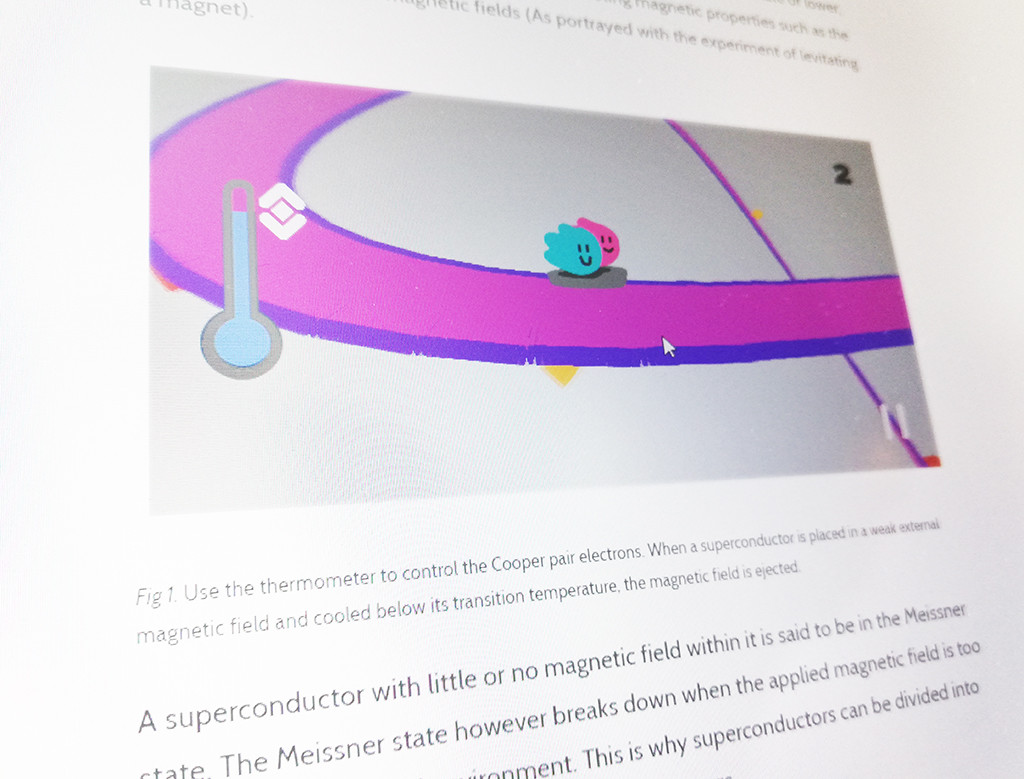What if instead of pictures, tables, and charts, research or articles would use small embedded interactive games?
What would such games be like, and what are the ways in which games can communicate?
We call these “Playable Concepts”
What are Playable Concepts?
The Aalto Online Learning’s pilot project Playable Concepts has successfully completed its first phase. From October 2019 till May 2020, the Playable Concepts team (led by project leader Dr. Annakaisa Kultima) has created and examined the educational utility of small games that explain educational concepts. The team has also conducted workshops for students and Aalto staff, helping them learn how to create their own game as playable concepts.
Playable concepts refer to tiny embedded mini-games that can be treated as words, images, or ludic atoms as part of communication.
The project aims to encourage teaching game development for non-game-creators, which will foster positive game cultures and their role of games as part of the educational materials.
The driving idea is that games created as playable concepts do not have to be complete or self-sustaining digital games, but become meaningful when together with other forms of media — such as text, images, or verbal explanations. They can be embedded in the middle of texts, or into teaching materials. Playable Concepts can also be simple enough to play so that the student or teacher can perform the game immediately while reading the text with short play sessions. These games can also be shared and modded, to be reused for other occasions.


Workshops and materials for teachers
Throughout the Autumn 2019 and Spring 2020 period, the Playable Concepts project team conducted several workshops for Aalto teachers, students, and anyone who is interested in using games for educational purposes. The first workshops were physical location workshops at the Aalto Campus and at the Mindtrek 2020 conference in Tampere, while the latest workshops of the spring took place virtually on Zoom.
As part of the project, the team’s research assistants Christina Lassheikki and Solip Park also created a shared library of Construct 3-based HTML5 sample games, and 2D art assets, that can be used as part of different course materials. Anyone can freely download and modify these sample games and use them during their lectures, courses, or workshops. The Playable Concepts project has also built a series of entry-level tutorials that help teachers to build their own tiny educational games, all available at the playableconcepts.aalto.fi-website.


The Playable Concepts team is hoping to expand the game library and tutorials, as well as to conduct more game-making workshops for teachers and researchers in the future.
For more details about the Playable Concepts project, and to download sample games, art assets, and tutorials, go to Playable Concepts website at: https://playableconcepts.aalto.fi/
You can also find how playable concept games are being used in practice, with Unity game engine, in the “Quantum Game Course” — with a collaboration between Aalto Department of Media and Department of Applied Physics:
https://quantumgames.aalto.fi/8-playable-concepts/
—
The playable Concept project team 2019-2020
- Dr. Annakaisa Kultima, a post-doc researcher at the Department of Media
- Christina Lassheikki, Research Assistant (MA) at the Department of Media
- Solip Park, Research Assistant (MA) at the Department of Media
With the collaboration with
- Dr. Tomi Kauppinen, Aalto Online Learning & Department of Computer Science
- Noora Heiskanen, Quantum Game Course 2019-2020
- Teemu Kokkonen, Quantum Game Course 2019-2020
Publication
- Annakaisa Kultima, Christina Lassheikki, Solip Park and Tomi Kauppinen. Designing Games as Playable Concepts: Five Design Values for Tiny Embedded Educational Games. In DiGRA ’20 – Proceedings of the 2020 DiGRA International Conference: Play Everywhere, the Digital Games Research Association, Tampere, Finland, June 2020.

